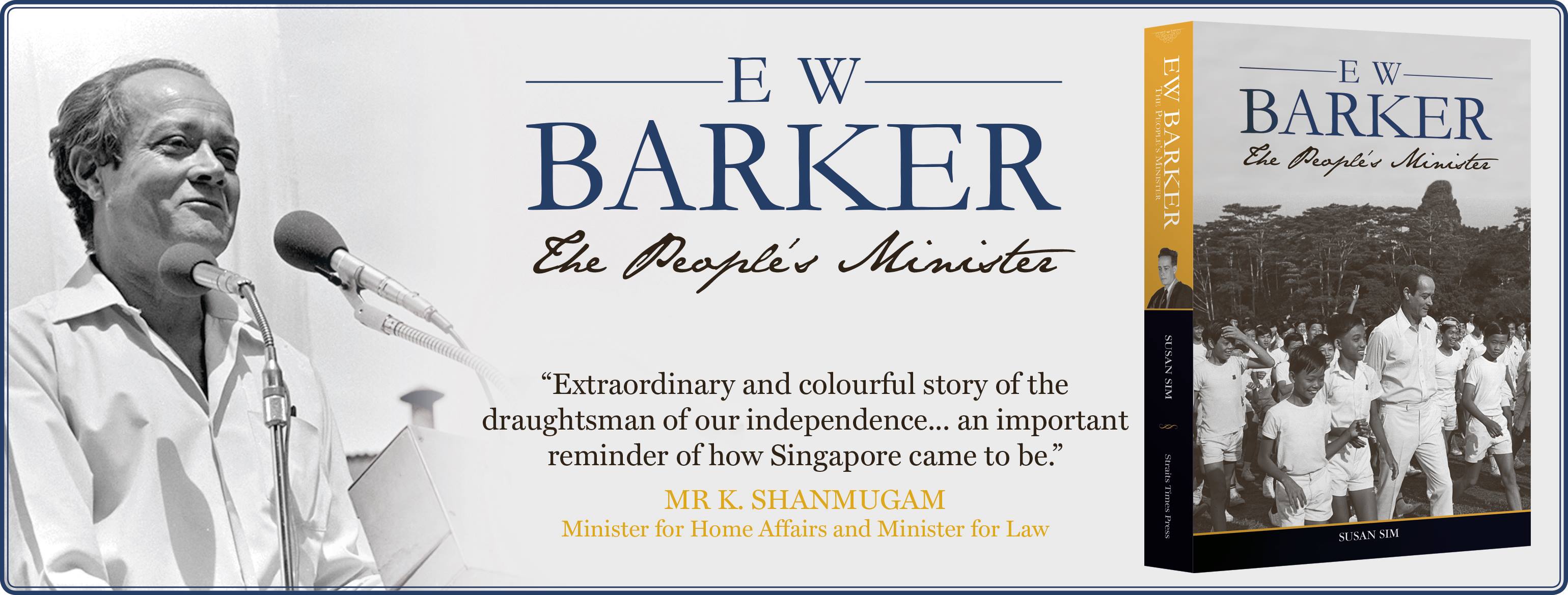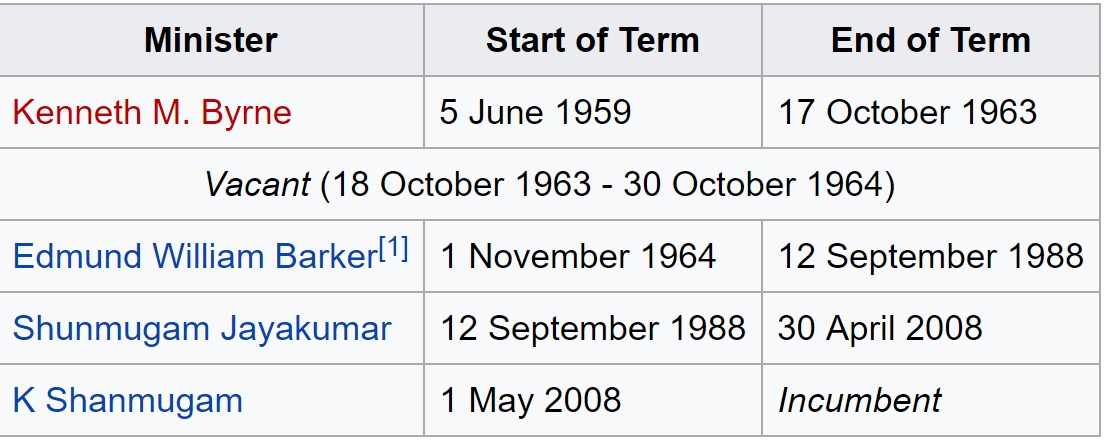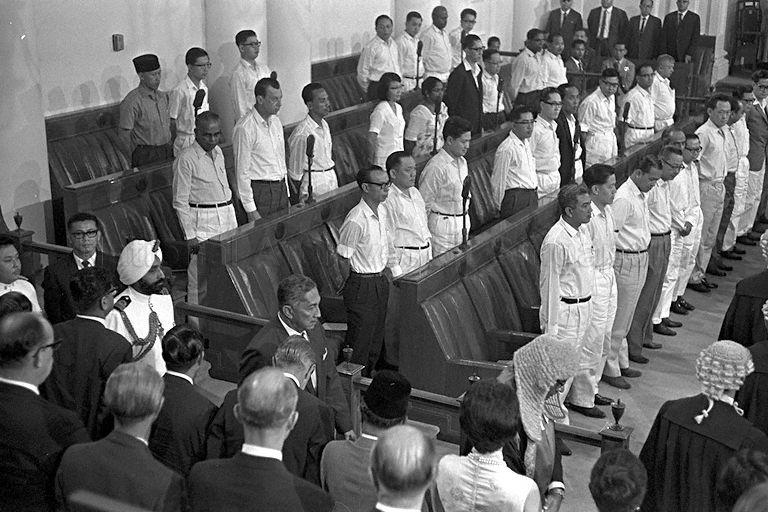"Shouting like a woman", "pimps" and "traitors".
These were some of the colourful words used by members of parliament (MPs) during the early days of Singapore's parliament, when Edmund William Barker was the Speaker of Parliament.
These stories and more were portrayed in a recently published biography of Barker, one of Singapore's pioneer generation leaders and Singapore's longest-serving Law Minister.
Titled E. W. Barker: The People's Minister, the well-researched 428-page tome revealed the reluctant politician's colourful and unconventional life he led, and his important contributions to Singapore, as he was chiefly responsible for the drafting of the Separation Agreement between Singapore and Malaysia.
Below were the parliamentary exchanges between Barker (as Speaker), the late Foreign Minister S Rajaratnam, and two Opposition MPs in 1963:
On woman and traitors
Tan Cheng Tong (Jalan Kayu)(In Mandarin): Mr Speaker, Sir, the Minister opposite is not respecting the Standing Orders of this House. He is shouting like a woman, and scolding and pointing to the Members on this side. He is like a woman abusing other people.
S Rajaratnam (Culture Minister): It is necessary to identify traitors.
Barker: Again the Minister for Culture is attacking the conduct of Members. That is not allowed under our Standing Orders.
Rajaratnam: I am referring to the speeches they have made for the last two and a half hours or three hours.
Barker: But he is calling them traitors.
Rajaratnam: Sir, they are not traitors. They are spokesmen for Indonesia.
Barker: That is better.
Rajaratnam: I withdraw the word "traitors". They are spokesmen for Indonesia, spokesmen for Jakarta, spokesmen for Medan ---
Poh Ber Liak (In Mandarin): Mr Speaker, Sir, I doubt whether the Minister for Culture has studied the financial statement. He has not made a detailed study of the financial statement. That is why he is talking rubbish.
Barker: If the Member for Tampines is interrupting any Member, he rises either on a point of order or on a point of clarification. He does not start off, as many Members have done, by making a speech. What is the point of order?
Poh Ber Liak (In Mandarin): Mr Speaker, Sir, I urge that the Minister for Culture should speak on the Budget statement and not on something else.
Barker: I think we have had enough of what the Minister for Culture thinks these Members are. I have reminded him that we are debating the Budget. Can we get on to the Budget?
.....
"Political pimps"
Rajaratnam: Mr Speaker, I was talking about the Budget and it is within the province of any Assemblymen to reply to points made on the Budget by Opposition Members.
They have been talking for four hours on confrontation - an essential point with which they have been trying to confuse the people - and it is necessary for me in the interests of the country and of this Assembly to expose their arguments and to indicate the purpose behind the long dreary rubbish that has been propounded in this Assembly for the last four days...
Mr Speaker, Sir, during the last few days they have been talking about the Communist bogey. I will not venture into a new line of argument - I will reserve that for Monday - about the so-called Communist bogey. But we are a socialist Government and both as individuals and as members of a political Party we are therefore neither creatures, spokesmen or servile nominees of big capitalist concerns nor, at the other extreme like the Barisan Sosialis, puppets of Communist manipulators or political pimps for Indonesian confrontationists.
Barker: Order. The Minister is now using unparliamentary language.
Rajaratnam: Sir, but "political pimps" has a different connotation.
Barker: In my opinion, the word "pimps" in any context would be unparliamentary.
Rajaratnam: May I use the words "political purveyors of flesh"?
Barker: Please proceed.
This even-handedness of Barker stood out in the early years of the parliament, as he allowed both sides of the aisle their time of the day while still keeping them on point regardless of their seniority in parliament.
 Source: Straits Times Press Facebook.
Source: Straits Times Press Facebook.
The definitive book on Barker
While the book attempts to highlight the various contributions that Barker made to Singapore, what stood out for a reader was this larger than life character who did not become defined by the public offices that he held.
In fact, Barker's personality meant that it was easy to remember his humanity behind the posts he held -- his even-handedness as a Speaker, his sincere friendships with the Malaysian leaders in the midst of the separation agreement, his mastery of important details as a National Development Minister and his self-confidence as a second Minister for Foreign Affairs.
At the speech he gave during the book launch, Home Affairs and Law Minister K Shanmugam highlighted Barker's role in ensuring "an amicable separation", due to his friendships with key Malaysian leaders.
To conclude, Barker should not be remembered merely as the man who gave Singapore the legal basis for our independence -- he was a patriot and more importantly, he did not think of himself as a symbol of affirmative action for Eurasians.
In fact, he "never referred to himself as a Eurasian Minister" -- he was a Singaporean first.
But what is the significance of this book?
Besides appreciating the life of a pioneer generation leader, the book's main contribution is to allow us to "study the past, so that we can "divine the future". For example, who will be the next Law Minister of Singapore?
Law Ministers are a rare breed in Singapore politics.
Since Singapore's independence, there are only three Law Ministers, and they have an average tenure of 16.5 years, rising to 21 years if you exclude the current Law Minister.
 Source: Wikipedia.
Source: Wikipedia.
And Barker was, according to both Shanmugam in his speech, and Chief of Government Communications Janadas Devan in the book, "the template of what a law minister should be".
Shanmugam: "Eddie Barker defined the Law Ministry more than most other ministers defined their ministries in their generation. He is the template of what a law minister should be; the ideal as a model".
Janadas Devan believed Barker was Lee Kuan Yew's "definition for a law minister"..."Don't underestimate Eddie Barker's influence. In Mr Lee's mind, Mr Barker was the template of the law minister". E. W. Barker: The People's Minister
After all, Barker was entrusted by Lee with the sole responsibility of drafting the Separation Agreement.
And Barker has done it alone with such skill and shrewdness that not only was the Separation agreement never challenged in any international tribunal, the Singapore-Malaysia Water Agreement was enshrined in Malaysia's constitution.
So here you have it: A Singapore Law Minister must have a first class legal mind, be a reluctant politician, become a decisive and shrewd operator and act with toughness (if needed).
And one thing's for sure -- Law Minister Shanmugam will continue to helm the Ministry for a while longer -- he is only in his eighth year.
Get a copy if you are auditioning for the role and if you think you have what it takes to be the Next Top Model Law Minister.
Top photo via
If you like what you read, follow us on Facebook and Twitter to get the latest updates.
If you like what you read, follow us on Facebook, Instagram, Twitter and Telegram to get the latest updates.
